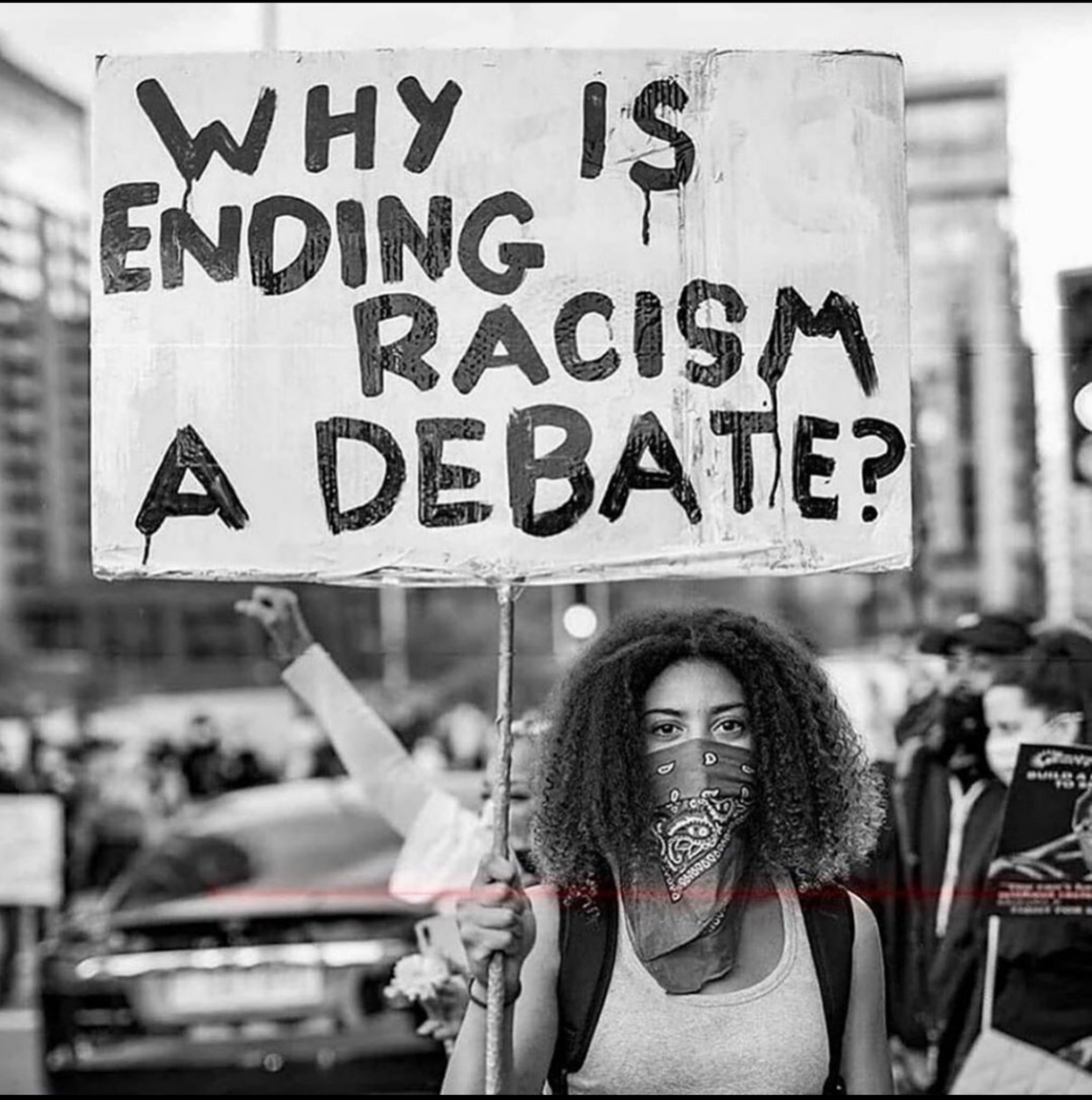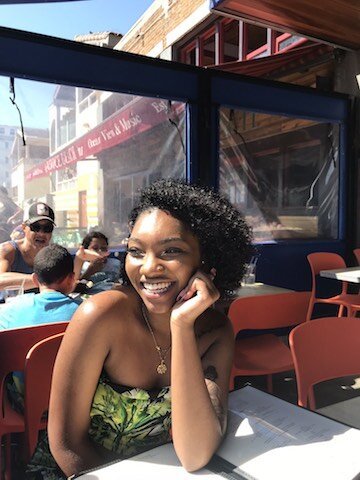A Movement, Not A Moment: Sabrina's Story From D.C.
This week’s feature for Ars Poetica’s Writing Series for BIPOC Voices is written by Sabrina Anthony. All pieces within the series have been curated by Shakilya Lawrence.
CW: //harsh language, police brutality//
We’re in the middle of a race war, a pandemic, and a self-identity crisis. Above it all, I am a BLACK woman, and I’m not ashamed of that. Yet the world seems to take my identity as its own without wanting to face the consequences that being Black in America takes.
We need to find our voices in each other, let others find comfort in our story, and let them find ammunition as well. We are not done fighting for equality. So when we say NO justice, NO peace, it is real.
We are here.
““We are not outnumbered, We are out-organized.””
The birth of Concerned Citizens seemed to happen overnight.
Several organizers and I saw the need to centralize the protests in DC. Initially, we were strangers to each other, however we found friendship in this fight. We felt the shift after George Floyd and Breonna Taylor’s wrongful deaths and saw how it shook the world. We saw the anger, the outrage, and deeply felt those same sentiments as well. But we needed a 5 point agenda, something concrete we could all stand on. Being angry wasn’t enough. We needed a plan; we needed action. Our end goal included “A New America” — one that was inclusive, didn’t stem from hate, and made “justice and freedom for all” a reality. It seemed all too surreal that 8 young activists, all under the age of 25, could make people listen and make this our new normal. We were intentional about this being a movement, not a moment. From the beginning, we set the tone in our group that we will still march, protest, and show up even if only one person came out with us. Like Malcolm X stated, “We are not outnumbered, We are out-organized.”
The first day was life-changing, the day I realized this America that we live in was not an America I was proud of. Starting on New York Ave at Chase Bank, we marched to the capitol accompanied by no more than 30 people. As we march, strangers join us. Cars going by were honking as people screamed, “Keep going!”. It was at this moment I understood exactly what John Lewis meant when he spoke about “good trouble.” We were in the middle of it; we were it. When we got to the capitol, we opened the conversation up, giving anyone in the crowd a chance to speak. There was an outpour of those who spoke out on gun violence, police brutality, police reform, sexual assault, mental health, and democracy. The sense of community and support was real and clearly our people were hurting. The black community was at war with the world. There are real people in DC, and we are not politicians. We knew after this day, it was only the beginning—the start of the revolution.
We went on protesting every day for a week. However, during the 2nd week, DC deployed the military, blocked off streets, and gated every major landmark we stopped to speak at on these matters over the week. The police and military were armed with shields, rubber bullets, and tear gas. This in itself saddened me. Why are we being portrayed and treated as animals that need to be put down or controlled? But then again that’s what America was built on and what they have perpetrated for over 400 years— the fear and silencing of our people. That night, a peaceful protest turned into a community war after law enforcement launched their attack on us. People were passing out, losing their eyes to rubber bullets, and were being teargassed and pepper-sprayed. During their brutal assault on us, I was hit three times by rubber bullets.
Is this democracy?
At the end of the night, I went home sick to my stomach, upset and discouraged that this is the experience of being black in America. During this same week, Mayor Muriel Browser painted 16th street with ‘Black Lives Matter’ in big, bold letters and even renamed the street Black Lives Matter Plaza.
Is this all we are worth? Performative stunts?
We are tired of being fed distractions when what we need is progressive change. Black lives matter is not a new trend, a PR stunt, a performative act, or bandwagon to jump on. We are real people with our lives on the line over something we cannot change, our skin color.
The blood that stains these streets is still real. We’re being targeted, getting shot at, and losing our lives on these same streets. The naming of Black Lives Matter Plaza was just one of many performative acts of faux solidarity, lacking any sort of substantive shift in priorities or resources. When we say defund MPD, it is not an ask; it is a demand. We put you in office, you work for US—the people. We are tired of begging for freedom, equality, and justice, liberties that are rightfully ours.
As the protests grew throughout the weeks, so did our following. We began taking interviews with the Washington Post and other local news outlets. Not soon after, we were collaborating with other DC activist groups, such as Black Lives Matter and Freedom Fighters. We even had the family of Atatiana Jefferson—a young lady who was fatally shot by Fort Worth police in her own home—come speak about their loss and experience of this brutal reality and they encouraged us to keep going in our fight for change. We used our newly gained momentum to reveal and speak on our newly proposed Bill of rights and what this “New America” could look like. We adopted the tradition of ending each protest by reading out the names of all the black and brown lives lost at the hands of the people who are supposed to “Protect and Serve.” This was good trouble. America was listening and watching as was the entire world. We knew this moment, if utilized effectively, could yield a social impact that may have taken decades otherwise.
““It is our duty to fight for our freedom. It is our duty to win. We must love each other and support each other. We have nothing to lose but our chains.””
As Covid numbers spiked in July, Concerned Citizens decided to take a mental hiatus. By then, we had been protesting every day for about a month. We had to be intentional about the movement and be honest about the fact that we needed a break. We told our supporters to prioritize mental health and self-care at this time because there is no movement if we’re all burnt out.
Photo by Markus Spiske from Pexels
On the 4th of July weekend, I went to Ocean City, MD. This weekend showed me why our work was so important, the value of our current movement, and how much institutional racism plays a part in keeping us marginalized and silenced. That weekend, my friends and I were racially profiled, harassed, and wrongfully arrested by Ocean City police department. Prior to the arrest, there was an altercation in which we had been called “n*ggers” by white women who were upset about a parking spot.
We were arrested on the boardwalk of Ocean City in broad daylight. When the cops approached us, I froze in fear. I had been protesting for a month and seen things that have sunken my heart. I’ve witnessed cops taking a knee on protestors’ necks, ignoring when they say, “I can’t breathe” (in reference to George Floyd). Their response was always, “That doesn’t work here”. So my first instinct was to tell bystanders to take out their phones.
Imagine how many names go unknown and no justice served because there weren’t any cameras or witnesses.
I had my phone in one hand and ice cream in the other. As my two friends and I were being handcuffed, we started yelling out our social media handles, telling people to record so this unjust situation could go viral. All I could think about was Sandra Bland. “I did not kill myself in my cell,” I kept saying. A young black woman who was outspoken, the world’s greatest threat. I couldn’t help but cry because of the unknown. As my friend was getting handcuffed beside me I hear her ask, “Aren’t you going to read us our rights?”
The officer replied, “I know you see that in movies, but this is not how it goes here.”
What do you even do or say in a situation like this? All logic flies out the window, and I almost forgot how to even speak. I am appalled as the officer puts on gloves and starts to pat us down. While frisking us, my friend looks at me and says, “I don’t want to get raped.” I couldn’t help but continue to cry.
It’s heartbreaking that this is our experience in America. And I’m saddened that we as black women are so unprotected, our mind instantly goes to the worst scenario.
““The most disrespected person in America is the Black woman. The most unprotected person in America is the Black woman. The most neglected person in America is the Black woman.””
This whole encounter was still being recorded on my phone, including the ride there which was hot, unconformable, and absolutely terrifying. My friends and I try to laugh it off, but deep down we all knew what each other were thinking and feeling. We were frightened and clueless about what was going to happen once we got to the station.
Once we got to the police department, our fingerprints were taken and I am separated from my friends. Hours went by, however, it felt like days. A guard came by with food to give to the other people within the cells. When I inquired if we got food, the guard responded by saying, “You haven’t been here long enough.” The cells were filthy, small, and unsanitary, and people came and went without cells being re-sanitized. No masks or facial coverings were given to stop a potential spread. Social distancing was not enforced, despite America’s steady increase in Covid numbers. It was obvious that possible exposure and our health was not a concern.
My cellmate expressed to me that she had been here for 20 hours. “Don’t expect to get out tonight,” she said.
Hours went by, people continued to come and go. I couldn’t understand why they weren’t prioritizing us. Why did it take 30 minutes to speak to someone at the front desk? Where was the urgency? Why were we not being told our charges? Why were we being treated like criminals? It took 24 hours before we finally received a copy of our charges and got to see the commissioner in charge of letting us know if we’re going to be held or let go awaiting our court date. My friends and I were released, and are still awaiting trial.
Institutional and systemic racism is still very much alive within America’s society. The current prison system is modern-day slavery. I am tired of begging people we voted in office to see our lives matter. This is our fight, we must save ourselves.
To my people,
Continue to speak.
Continue to stand.
Continue to challenge systems of racism, bigotry, and hatred.
Continue to be PROUD of who you are, and walk in authority.
The revolution is now, and it will be televised.
Sabrina is a millennial activist, writer, and poet. She is passionate about policy reform, tech advancement, and leveling the playing field for women of color across all careers.
Socials // IG: @yungsabb Twitter: @yungxsab



